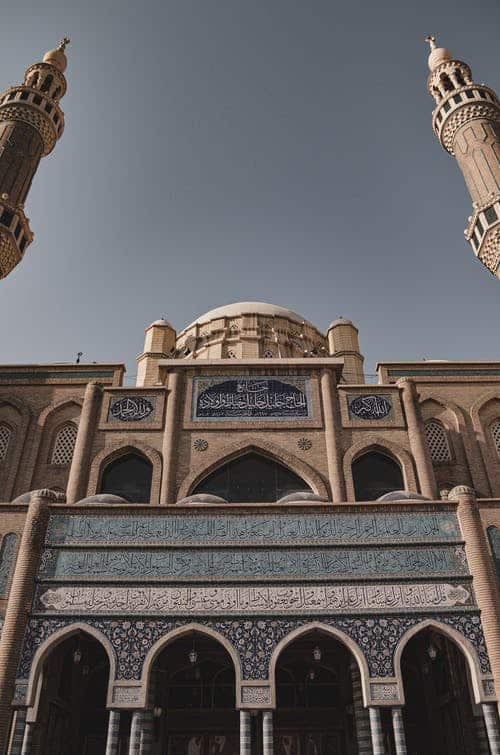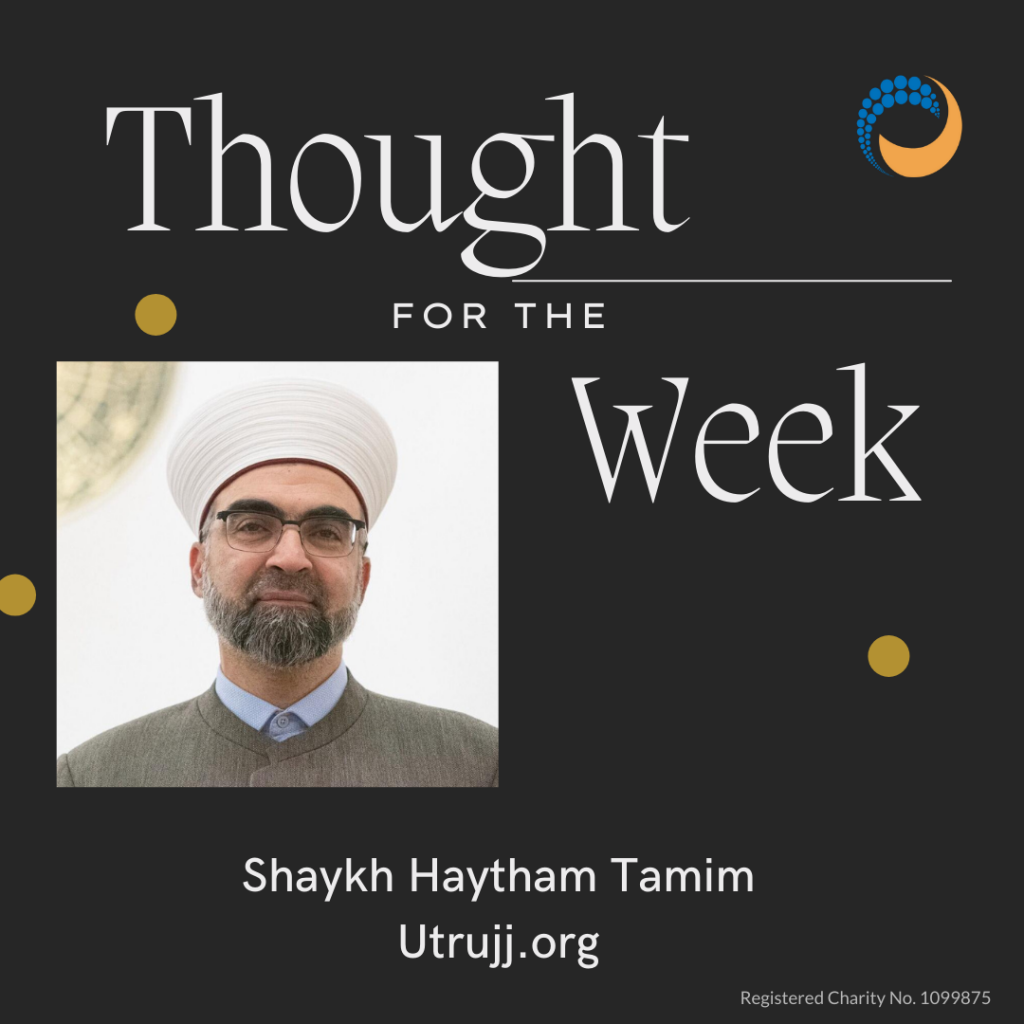The tragedy of Karbala should not make us revert to the mourning practices of Jahiliyya

Todays reminder is about unity and not returning to the habits of pre-Islamic (Jahiliyya) times. In Surat al Imran, Allah Almighty says:
﴿١٠٣﴾ وَاعْتَصِمُوا بِحَبْلِ اللَّهِ جَمِيعًا وَلَا تَفَرَّقُوا ۚ وَاذْكُرُوا نِعْمَتَ اللَّهِ عَلَيْكُمْ إِذْ كُنْتُمْ أَعْدَاءً فَأَلَّفَ بَيْنَ قُلُوبِكُمْ فَأَصْبَحْتُمْ بِنِعْمَتِهِ إِخْوَانًا وَكُنْتُمْ عَلَىٰ شَفَا حُفْرَةٍ مِنَ النَّارِ فَأَنْقَذَكُمْ مِنْهَا ۗ كَذَٰلِكَ يُبَيِّنُ اللَّهُ لَكُمْ آيَاتِهِ لَعَلَّكُمْ تَهْتَدُونَ
And hold firmly to the rope of Allah, all together, and be not divided. And remember Allah’s favor upon you; when you were enemies, and He united your hearts, and by His grace you became brethren. And you were on the brink of a fiery pit, and He saved you from it. Thus Allah clarifies his revelations to you, so you may be guided. (3:103)
All Muslims across the world have to follow the Quran and the Sunnah, the traditions of the Prophet peace be on him) regardless of their sects or school of thought. The main source for all Muslims is the Quran and Sunnah. Allah Almighty mentioned in the Quran that when you have a disagreement refer it to Allah and His Messenger (peace be on him). This is the default position for all Muslims.
O you who believe, obey Allah and obey the Messenger and those in authority among you. Then, if you quarrel about something, revert it back to Allah and the Messenger, if you believe in Allah and the Last Day. That is good, and the best at the end. (4:59)
Ashura
It would take a full course to address the issue of Karbala in detail which I will do in the future inshallah.
It is a calamity that happened to our Ummah, the martyrdom of Al Husayn (may Allah be pleased with him). Without doubt we feel pain at his martyrdom. Abu Abdillah bin Husayn bin Ali bin Abi Talib (may Allah be pleased with him) was the grandson of the Prophet (peace be on him) and his brother Hasan (may All be pleased with him).
The Prophet (peace be on him) mentioned the virtues of Hasan and Husayn and their family in many narrations such when he (peace be on him) said:
Husayn is from me and I am from Husayn. Allah loves whoever loves Husayn. (Tirmidhi)
In this narration, the Prophet (peace be on him) is confirming the importance of his grandson. In another narration the Prophet (peace be on him) referred his grandsons as:
They are my two sweet flowers in the world. (Bukhari)
In another authentic narration he (peace be upon said):
Al Hasan and Al Husayn are the leaders of the youth in Paradise. (Tirmidhi)
Leaving aside the weak and fabricated narrations, there are numerous authentic, top level narrations in the same vein about the virtues of Hasan and Husayn.
Karbala
The tragedy which took place on 10th Muharram AH (680 CE), in Karbala, in Iraq coincides with many other historic occasions that have been marked on that day, such as fasting to commemorate the liberation of Musa (peace be on him) and his Ummah, Bani Israel from Firaun. We celebrate of the freedom of the Jewish people, as my Jewish friend calls it. I like this way of putting it and I hope that one day they will celebrate the liberation of the Palestinians and give them relief from the oppression they are enduring in Gaza and the West Bank.
To cut a long story short, Al Husayn went to Iraq to get support to fight oppression and the main reason for his opposition to Yazid, the Caliph at that time was because Yazid was not following prophetic guidance and he was not holding a shurah (consultation) to choose the imaam for the Ummah. We do not have the concept of inheriting positions of authority by birth in Islam.
Al Husayn wanted to cling to the prophetic way and revive the prophetic way. Although when we read the details of the saga, we see that many Companions, such as Ibn ‘Abbas advised him not to go because his father and brother had already experienced a lack of support from the people of Iraq. Nevertheless destiny would unfold as it had been written.
The martyrdom took place on 10th Muharram (al Ahshr).
Do we mark the death of Al Husayn? No. We do not. We celebrate his life. Similarly we don’t mark the death of the Prophet Muhammad (peace be on him), we celebrate his life.
How do believers deal with calamity?
As stated earlier, our reference across the world as Muslims is the Quran and the Sunnah in good times and when we face trials and tribulations. As Allah stated, and consequently our reaction to death (no matter what the circumstances surrounding it) is always to accept it and say:
الَّذِينَ إِذَا أَصَابَتْهُم مُّصِيبَةٌ قَالُوا إِنَّا لِلَّهِ وَإِنَّا إِلَيْهِ رَاجِعُونَ
أُولَٰئِكَ عَلَيْهِمْ صَلَوَاتٌ مِّن رَّبِّهِمْ وَرَحْمَةٌ ۖ وَأُولَٰئِكَ هُمُ الْمُهْتَدُونَ
Those who, when a calamity afflicts them, say, “To God we belong, and to Him we will return.”
Upon these are blessings and mercy from their Lord. These are the guided ones. (2:156-157).
Moreover, being disunited is the not allowed in Islam. The Prophet (peace be on him), as narrated by ibn Umar (may Allah be pleased with him) said:
عَنِ ابْنِ عُمَرَ، أَنَّهُ سَمِعَ النَّبِيَّ صلى الله عليه وسلم يَقُولُ “ لاَ تَرْجِعُوا بَعْدِي كُفَّارًا، يَضْرِبُ بَعْضُكُمْ رِقَابَ بَعْضٍ ”.متفق عليه.
“Beware! Do not revert to disbelievers after my death by striking (cutting) the necks of one another.” (Bukhari and Muslim)
Grief is not a licence to revert to Jahiliyya practices
Abdullah bin Mas’oud (may Allah be pleased with him) narrated that the Prophet (peace be on him) said:
“He who slaps his cheeks, tears his clothes and and calls the calls of the Jahiliyyah : follows the ways and traditions of the Days of Ignorance is not one of us.” (Bukhari and Muslim)
He made it clear that we cannot go back to the practices of Jahiliyya, which the revelation saved us from.
When the Prophet (peace be on him) went to bury his son, he was carrying him in his arms and crying. Abdur Rahman bin Awf was surprised and asked him why he was crying, so he clarified that he had not been commanded to refrain from crying, but from wailing and screaming and showing undignified displays of grief which was the tradition and custom of that time.
عَنْ جَابِرِ بْنِ عَبْدِ اللَّهِ، قَالَ أَخَذَ النَّبِيُّ صلى الله عليه وسلم بِيَدِ عَبْدِ الرَّحْمَنِ بْنِ عَوْفٍ فَانْطَلَقَ بِهِ إِلَى ابْنِهِ إِبْرَاهِيمَ فَوَجَدَهُ يَجُودُ بِنَفْسِهِ فَأَخَذَهُ النَّبِيُّ صلى الله عليه وسلم فَوَضَعَهُ فِي حِجْرِهِ فَبَكَى فَقَالَ لَهُ عَبْدُ الرَّحْمَنِ أَتَبْكِي أَوَلَمْ تَكُنْ نَهَيْتَ عَنِ الْبُكَاءِ قَالَ “ لاَ وَلَكِنْ نَهَيْتُ عَنْ صَوْتَيْنِ أَحْمَقَيْنِ فَاجِرَيْنِ: صَوْتٍ عِنْدَ مُصِيبَةٍ: خَمْشِ وُجُوهٍ وَشَقِّ جُيُوبٍ، وَرَنَّةِ شَيْطَانٍ ”. رواه الترمذي.
Jabir bin Abdullah narrated:
“The Prophet took Abdur-Rahman bin Awf by the hand and went with him to his son Ibrahim. He found him in his last breaths, so he took him and put him on his lap and cried. Abdur-Rahman said to him: ‘You cry? Didn’t you prohibit (your followers) from crying?’ He said: ‘No. But I prohibited two foolish immoral voices: A voice during a calamity while clawing at one’s face and tearing one’s clothes, and Shaytan’s scream.'” (Tirmidhi)
In another narration, A’isha reported God’s Messenger (peace be on him) as saying:
عَنْ عَائِشَةَ قَالَتْ: قَالَ رَسُولُ اللَّهِ صَلَّى اللَّهُ عَلَيْهِ وَسَلَّمَ: «مَنْ أَحْدَثَ فِي أَمْرِنَا هَذَا مَا لَيْسَ مِنْهُ فَهُوَ رد». مُتَّفَقٌ عَلَيْهِ.
“If anyone introduces into this affair of ours (our deen) anything which does not belong to it, it is rejected.” (Bukhari and Muslim)
Abdullah bin ’Amr bin al-’Aas (may Allah be pleased with them) narrated that the Messenger of Allah (peace be upon him) said:
عَنْ عَبْدِ اللَّهِ بْنِ عَمْرِو بْنِ الْعَاصِ رَضِيَ اللَّهُ عَنْهُمَا، قَالَ: قَالَ رَسُولُ اللَّهِ صلى الله عليه و سلم “لَا يُؤْمِنُ أَحَدُكُمْ حَتَّى يَكُونَ هَوَاهُ تَبَعًا لِمَا جِئْتُ بِهِ”. حَدِيثٌ حَسَنٌ صَحِيحٌ، رَوَيْنَاهُ فِي كِتَابِ “الْحُجَّةِ” بِإِسْنَادٍ صَحِيحٍ.
“None of you [truly] believes until his desires are subservient to that (Shariah) which I have brought.” (Imam an-Nawawi)
The death of Al Husayn should unite us and not disunite us
These narrations show that the Prophet (peace be on him) was keen that the Ummah has to come together and stick to the Quran and follow the guidance of Allah Almighty and His Messenger.
Yes, the events at Karbala were undoubtedly painful for our Ummah and the martyrdom of Al Husayn was tragic, however we should not act in a way that is outside the Shariah.
The main reason for the revolution of Al Husayn was to unite the Ummah and bring them all on the path of the Prophet Muhammad (peace be on him) and to appoint a leader who is spreading justice.
We should be following the same concept which is the prophetic concept of protecting the oppressed against their oppressors and doing our best to cling to the prophetic way and prophetic guidance, which is what Al Husayn was doing.
Following the prophetic guidance overrides emotions
If we want to follow the guidance of the Prophet (peace be on him) we need to follow the Quran. Being grief stricken is not an excuse to go against prophetic guidance nor are we premitted to have an uncontrollable outpouring of grief. The Shariah is the guidance for all of us. It should not be a way to disunite the Ummah, when Husayn went to unite the Ummah and bring back the prophetic practice.
May Allah enable us to always follow the Quran and Sunnah and defend the oppressed and fight oppression and corruption. Ameen
Shaykh Haytham Tamim
- The truth is more powerful than lies
- Does a bride’s wali have to be Muslim?
- Is is permissible to lead a salah split over different rooms?
- Global IT outage. When systems go down…
- The concept of worship. What are ibadah and ihsan – and how do they lead to self development?


Recommended Posts

The truth is more powerful than lies
July 26, 2024

Global IT outage. When systems go down…
July 19, 2024

